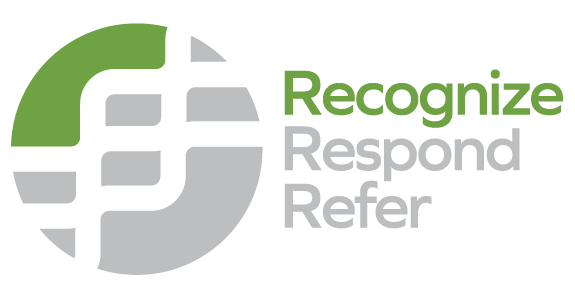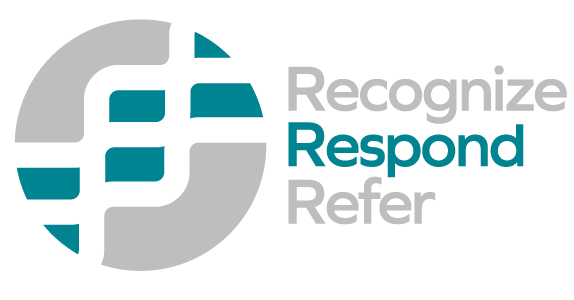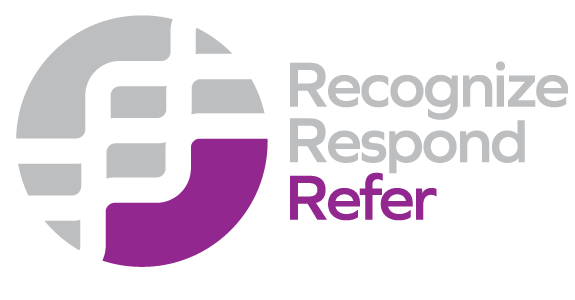Recognize, Respond, Refer is a framework for building our campus community’s capacity to support mental health and prevent suicide.
Through trainings, education, and resources, this framework helps students, faculty, and staff grow their skills to better recognize signs that may indicate someone needs support, respond compassionately, and refer someone to resources for continued support.
Learning Opportunities
Online Trainings
Access Recognize, Respond, Refer online suicide prevention trainings for students, faculty, and staff. Trainings take one hour to complete online through Canvas.
Live Workshops
Continue to build your mental health support skills with advanced and customized Recognize, Respond, Refer workshops.
The Recognize, Respond, Refer Approach
Most people experiencing suicidal thoughts show outward signs that may alert you that they are in distress. Although some individuals might not show any signs, it’s important to watch for common warning signs.
This is an accordion element with a series of buttons that open and close related content panels.
Common Warning Signs for Suicide
- Referencing or talking about suicide or a desire to not live anymore
- Out-of-character behavior, such as giving away possessions
- Lowered self-worth or confidence; feeling like a burden; feeling hopeless
- Not showing up for obligations; isolating
- Changes in mood
- Eating or sleeping more or less
- Relationship difficulties; recent breakup or falling out n
- Less attention to personal hygiene
- Using alcohol or drugs more frequently
Once you are in a private, comfortable place, initiate a check-in. Name the specific warning signs you have recognized, and ask permission to check-in further.
This is an accordion element with a series of buttons that open and close related content panels.
Tips for Responding
- Listen without judgment. Listen with the intent to really understand what the other person is saying and feeling. Don’t minimize or dismiss their experiences. Pauses and silence are okay.
- Demonstrate empathy. Thank them for sharing. Acknowledge their experiences and concerns as valid.
- Offer hope. Reassure that help is available and ask permission to share resources. Let them know their life is important to you.
- Ask about suicide if you notice warning signs. This shows that you are ready to listen to their feelings and open to support them. Asking directly about thoughts of suicide can also help you determine the urgency of the situation.
- Express concern directly and honestly. It is more important to demonstrate that you care and to use active listening skills than to avoid a conversation. Name what you have recognized and ask to check in further.
- Reach out for help if necessary. Do not be sworn to secrecy. You can always consult the 24/7 UHS Mental Health Crisis Line (608-265-5600, option 9).
For referrals to be helpful, they should ideally:
-
Be responsive to student needs, as understood by the student
-
Be collaborative, not coercive
-
Be responsive to student beliefs and identities
Resources for Referral
This is an accordion element with a series of buttons that open and close related content panels.
Immediate Support – Available 24/7
- UHS 24/7 Crisis Line
For UW–Madison students, friends, and family members
Call 608-265-5600 (option 9) - 988 Suicide & Crisis Lifeline
For everyone
Call or text 988
- Crisis Text Line
For everyone
Text HOME to 741741
Population-specific Crisis Lines
- Steve Fund
People of color focus
Text STEVE to 741741 - Trevor Project
LGBTQ+ focus
Text ‘START’ to 678-678
Call 1-866-488-7386 - Trans Lifeline
Trans focus
Call 877-565-8860 - National Grad Crisis Line
Graduate student focus
Call 877-474-3457 - Veteran Crisis Line
Veteran focus
Call 988 (option 1)
*Not all lines listed here are available 24/7.
On-campus Resources
- UHS Mental Health Services
Call 608-265-5600 (option 2) for confidential, no-cost mental health services for all UW-Madison students. - Office of Student Assistance and Support
Call 608-263-5700 or email osas@studentaffairs.wisc.edu to receive support or consultation on additional resources that may be helpful, or request a follow-up with a student you are concerned about. - McBurney Disability Resource Center
Call 608-263-2741 or email info@mcburney.wisc.edu to explore resources and accommodations. Accommodations are available for mental health concerns.
- UWPD
Call 911 for immediate help or 608-264-2677 for non-emergency.
Population-specific Resources
- Prevent Suicide Wisconsin
Find relevant resources, including support based on gender, race, disability status, and more. - Black Mental Health Alliance
Organization aiming to develop, promote and sponsor trusted culturally-relevant educational forums, trainings and referral services that support the health and well-being of Black people and their communities. - Asian Mental Health Collective
Organization focused on de-stigmatizing mental health within Asian communities that offers a directory of therapists who specialize in serving Asian American, South Asian American, and Pacific Islander communities
For referral recommendations based on the level of urgency of a situation, see the second page of the Recognize, Respond, Refer Overview.
The inclusion of external resources is not an endorsement of authors or organizations by the Universities of Wisconsin. External resources are provided as an additional source of information and education.
Ready to learn more? Recognize, Respond, Refer online suicide prevention trainings are available for students, faculty, and staff.


